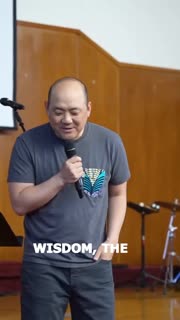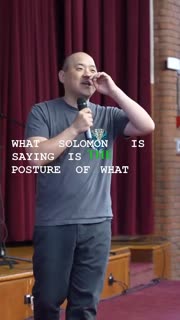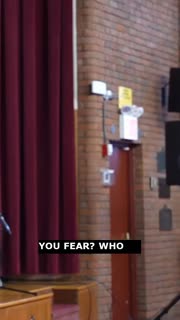Embracing Wisdom: The Fear of the Lord
Devotional
Sermon Summary
Bible Study Guide
Sermon Clips
### Quotes for Outreach
1. "The fear of the Lord is the beginning of knowledge, but fools despise wisdom and instruction. See, this statement is what Solomon's gonna come back to again and again, that what stations the wisdom from a Judeo-Christian principle over and against other kinds of philosophies and manners of approaching the world is the fear of the Lord, is that we're willing to surrender, willing to be a listener, that we're willing to get guidance, but we're willing to do so from a, from a supreme authority that transcends us." [16:26] (838 seconds)
2. "What is it that governs my life and begins to shape the way that I live and move and inhabit the world? Now, notice there were two words that were underlined that I wanted to bring attention to, because again, someone's bringing about, what is the posture of what wisdom looks like? And now notice he uses words like receiving instruction. And notice what he writes. He says, let the wise listen. High five your neighbor and say, listen. That's right. And add to their learning and let the discerning get guidance." [04:17] (-78 seconds)
3. "Jesus also comes into the world to demonstrate just how loving he is, how reliable he is. And Jesus comes into the world as the exact representation of God as what it says in the scriptures. And Jesus comes into the world to lay down his life for you and for me, show us and to demonstrate to us that there is a God who would go to any length so that you and I might be able to trust this God." [32:19] (32 seconds)
4. "Wisdom is not just simply these ethereal ideas that we talk about around a campfire. It's basically something that begins to inform the way that I go about my world. What is it that governs my life and begins to shape the way that I live and move and inhabit the world?" [04:17] (16 seconds)
5. "The moment when I think that I've got everything figured out, Jesus says, the moment you think you've found your life, you'll lose that. But the moment you've lost your life, that's when you find it. In other words, whenever I'm in a discipline, this position where I say, Jesus, I need you. I am not the master of my own universe. I'm not the captain of my own life. You are." [11:33] (20 seconds)
### Quotes for Members
1. "What Solomon is saying is the posture of what wisdom looks like is someone who has the disposition of a learner. In other words, someone who has a growth mindset. I'm continually learning and growing and being shaped and looking for growing in this thing we call wisdom. Now, this is really difficult to have, especially if you're someone who's really smart and you know it all and you've got multiple degrees and you figured it out and you make a lot of money and you've got a lot of friends that also have done the same." [05:48] (32 seconds)
2. "What we know might actually mask what we don't know and impede our ability to learn and perform. In other words, what we know, we know that kind of life works a certain way and this is the best way to do things. But that might be the greatest hindrance for us to actually learn new skills. And what she contends and what she invites people to do is to continue to be a rookie, to continue to learn." [10:55] (27 seconds)
3. "What Solomon is basically inviting is he's saying, will you take the posture of someone who's willing to learn and even unlearn what might be keeping you from going to greater levels of maturity? You know, as I was thinking about this kind of aspect, I was thinking of one of my favorite NBA basketball players. His name is Steph Curry." [11:33] (16 seconds)
4. "The greatest thing to fear is the God of the universe, is the one who created all things. And the question for me and for you is, will you give God this rightful place? Because Solomon, throughout the book of Proverbs, he's saying what wisdom truly looks like is to submit and to fear the greatest authority of all." [26:06] (24 seconds)
5. "Who or what do you fear? Who or what has authority in your life? Who or what is shaping the way that you go about relationships, the way that you handle money, the way that you go about your career, the way that you show up in spaces like this? Who or what do you fear? Who or what do you give authority to in your life?" [25:06] (35 seconds)
Ask a question about this sermon
1. "The fear of the Lord is the beginning of knowledge, but fools despise wisdom and instruction. See, this statement is what Solomon's gonna come back to again and again, that what stations the wisdom from a Judeo-Christian principle over and against other kinds of philosophies and manners of approaching the world is the fear of the Lord, is that we're willing to surrender, willing to be a listener, that we're willing to get guidance, but we're willing to do so from a, from a supreme authority that transcends us." [16:26] (838 seconds)
2. "What is it that governs my life and begins to shape the way that I live and move and inhabit the world? Now, notice there were two words that were underlined that I wanted to bring attention to, because again, someone's bringing about, what is the posture of what wisdom looks like? And now notice he uses words like receiving instruction. And notice what he writes. He says, let the wise listen. High five your neighbor and say, listen. That's right. And add to their learning and let the discerning get guidance." [04:17] (-78 seconds)
3. "Jesus also comes into the world to demonstrate just how loving he is, how reliable he is. And Jesus comes into the world as the exact representation of God as what it says in the scriptures. And Jesus comes into the world to lay down his life for you and for me, show us and to demonstrate to us that there is a God who would go to any length so that you and I might be able to trust this God." [32:19] (32 seconds)
4. "Wisdom is not just simply these ethereal ideas that we talk about around a campfire. It's basically something that begins to inform the way that I go about my world. What is it that governs my life and begins to shape the way that I live and move and inhabit the world?" [04:17] (16 seconds)
5. "The moment when I think that I've got everything figured out, Jesus says, the moment you think you've found your life, you'll lose that. But the moment you've lost your life, that's when you find it. In other words, whenever I'm in a discipline, this position where I say, Jesus, I need you. I am not the master of my own universe. I'm not the captain of my own life. You are." [11:33] (20 seconds)
### Quotes for Members
1. "What Solomon is saying is the posture of what wisdom looks like is someone who has the disposition of a learner. In other words, someone who has a growth mindset. I'm continually learning and growing and being shaped and looking for growing in this thing we call wisdom. Now, this is really difficult to have, especially if you're someone who's really smart and you know it all and you've got multiple degrees and you figured it out and you make a lot of money and you've got a lot of friends that also have done the same." [05:48] (32 seconds)
2. "What we know might actually mask what we don't know and impede our ability to learn and perform. In other words, what we know, we know that kind of life works a certain way and this is the best way to do things. But that might be the greatest hindrance for us to actually learn new skills. And what she contends and what she invites people to do is to continue to be a rookie, to continue to learn." [10:55] (27 seconds)
3. "What Solomon is basically inviting is he's saying, will you take the posture of someone who's willing to learn and even unlearn what might be keeping you from going to greater levels of maturity? You know, as I was thinking about this kind of aspect, I was thinking of one of my favorite NBA basketball players. His name is Steph Curry." [11:33] (16 seconds)
4. "The greatest thing to fear is the God of the universe, is the one who created all things. And the question for me and for you is, will you give God this rightful place? Because Solomon, throughout the book of Proverbs, he's saying what wisdom truly looks like is to submit and to fear the greatest authority of all." [26:06] (24 seconds)
5. "Who or what do you fear? Who or what has authority in your life? Who or what is shaping the way that you go about relationships, the way that you handle money, the way that you go about your career, the way that you show up in spaces like this? Who or what do you fear? Who or what do you give authority to in your life?" [25:06] (35 seconds)










